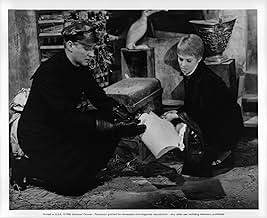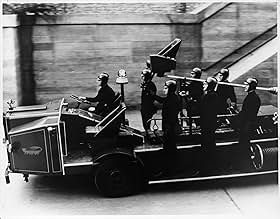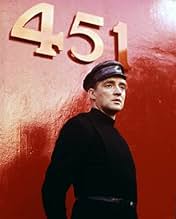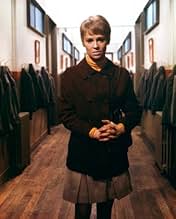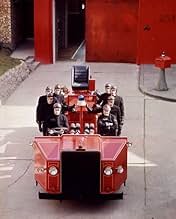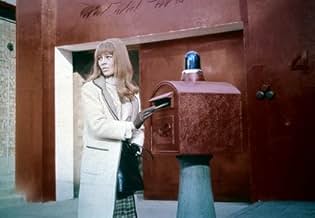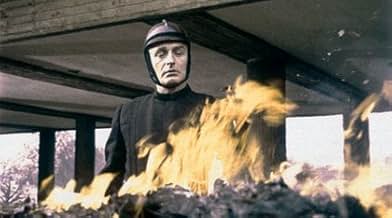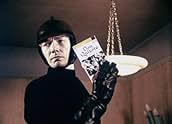Fahrenheit 451
- 1966
- Tous publics
- 1h 52min
NOTE IMDb
7,2/10
47 k
MA NOTE
Dans un avenir oppressif, un pompier dont le travail consiste à détruire tous les livres se met à s'interroger sur sa tâche.Dans un avenir oppressif, un pompier dont le travail consiste à détruire tous les livres se met à s'interroger sur sa tâche.Dans un avenir oppressif, un pompier dont le travail consiste à détruire tous les livres se met à s'interroger sur sa tâche.
- Réalisation
- Scénario
- Casting principal
- Nomination aux 1 BAFTA Award
- 1 victoire et 4 nominations au total
Gillian Aldam
- Judoka Woman
- (non crédité)
Alfie Bass
- Book Person: 'The Prince'
- (non crédité)
Yvonne Blake
- Book Person: 'The Jewish Question'
- (non crédité)
Arthur Cox
- Male Nurse
- (non crédité)
Frank Cox
- Book Person: 'Prejudice'
- (non crédité)
Fred Cox
- Book Person: 'Pride'
- (non crédité)
Noel Davis
- Cousin Midge - TV Personality
- (non crédité)
Judith Drinan
- Book Person - Plato's 'Republic'
- (non crédité)
Kevin Eldon
- Robert - First Schoolboy
- (non crédité)
Avis à la une
Go figure that I had the privilege of seeing "Fahrenheit 451," for free, on a big screen a few years back (an independent Illinois art house had gotten hold of what was allegedly one of the last surviving prints), and at the time hadn't the foggiest concept of how PRIVILEGED an event it was. Sitting in a theater crowded with college students on a budget with nothing better to do, I watched this diverting little retro item, appreciated its subtlety, nuance, bold visual style, and 'got' the message that if we're not careful, we'll be mindless drones having our desires dictated by The Tube (in current times, that's hardly a profound statement).
Francois Truffaut's adaptation of Ray Bradbury's novel is a bold visual feast that presents a time that might seem 'retrograde' in the eye of a modern pop-culture snob, but ultimately projects what a conceivable 'future' might look like (and not that CGI malarkey served up in "The Matrix"). Interiors of houses are awash in odd colors and give shelter to appliances that don't look dissimilar from our own; TV screens embedded in living-room walls play programs which vacuous housewives interact with sometimes. The film is so relentlessly confident in its appearance that it withstands the test of time.
Though if "Fahrenheit 451" only had its storybook style to rely on, it would fade and be filed away as a mere technical achievement. Truffaut, working from strong source material, concocts a riveting parable about ignorance and the things we, as humans, take for granted. The story follows Guy Montag, an Everyman who is employed as a fireman--a connotation which entails ransacking residences in search of books (reading and writing have been outlawed in this world) and burning them. He has a medicated-smile wife (Julie Christie), a quiet home life, and is in line for a promotion, until a neighbor (Christie again) inspires him to question his motives for working such a sordid job.
One character argues that books cause depression, making people confront unpleasant feelings. "Fahrenheit 451" sometimes runs the risk of lending truth to that statement--in some ways, it is a bleak commentary on civilization, but at the same time grounded in a benevolent humanity that offsets Orwell's brutal, pessimistic world of "1984" (though both texts and films share similar themes). This humanity is underlined in an upbeat, even comic ending (the details of which I won't divulge here).
"Fahrenheit 451" is a spellbinding work of art, in good company with other incendiary works ("A Clockwork Orange" and "Fight Club" come to mind) that have defied the constraints of time and age.
Francois Truffaut's adaptation of Ray Bradbury's novel is a bold visual feast that presents a time that might seem 'retrograde' in the eye of a modern pop-culture snob, but ultimately projects what a conceivable 'future' might look like (and not that CGI malarkey served up in "The Matrix"). Interiors of houses are awash in odd colors and give shelter to appliances that don't look dissimilar from our own; TV screens embedded in living-room walls play programs which vacuous housewives interact with sometimes. The film is so relentlessly confident in its appearance that it withstands the test of time.
Though if "Fahrenheit 451" only had its storybook style to rely on, it would fade and be filed away as a mere technical achievement. Truffaut, working from strong source material, concocts a riveting parable about ignorance and the things we, as humans, take for granted. The story follows Guy Montag, an Everyman who is employed as a fireman--a connotation which entails ransacking residences in search of books (reading and writing have been outlawed in this world) and burning them. He has a medicated-smile wife (Julie Christie), a quiet home life, and is in line for a promotion, until a neighbor (Christie again) inspires him to question his motives for working such a sordid job.
One character argues that books cause depression, making people confront unpleasant feelings. "Fahrenheit 451" sometimes runs the risk of lending truth to that statement--in some ways, it is a bleak commentary on civilization, but at the same time grounded in a benevolent humanity that offsets Orwell's brutal, pessimistic world of "1984" (though both texts and films share similar themes). This humanity is underlined in an upbeat, even comic ending (the details of which I won't divulge here).
"Fahrenheit 451" is a spellbinding work of art, in good company with other incendiary works ("A Clockwork Orange" and "Fight Club" come to mind) that have defied the constraints of time and age.
Ray Bradbury's disturbing vision of a possible future comes vividly alive in this film adaption of Fahrenheit 451. Reading for pleasure is now banned although I imagine you must have a certain degree of literacy to read food can labels and directions to operate all kinds of machinery. But read for enjoyment or for education about the world beyond the small space of earth you frequent, that's a big no-no in this future America.
Oskar Werner stars in Fahrenheit 451, he plays a fireman who have a different function in this society. Buildings and such are now fireproof so fireman have become the enforcers of the ban against books. They seek and burn books in whatever quantities they find. A good job in a police state, but not a good one if you have an inquiring mind such as Werner has.
Julie Christie plays two roles, Werner's pleasure driven wife and a schoolteacher whose unorthodox for that society's teaching methods have brought her under scrutiny. She does a good job in both characterizations.
Bradbury's themes are grounded in reality. Looking at American history it was a crime in many slave holding states to educate a slave. Let them be happy in their ignorance and they might not get ideas about a better life and won't rebel.
But this is a society that's beyond that kind of formal slavery so the answer is the old Roman one of bread&circuses. The circus in this case is television which has evolved into an interactive medium. The vast wasteland that Newton Minow characterized television as back in the day has gone beyond anything Minow was having visions about. Entertainment has really dumbed down and the circuses aren't too far from what used to entertain the Romans.
In the supporting cast you will remember Cyril Cusack as the fire brigade captain who functions as the spokesman for this new world and Bee Duffring as the book lady who martyrs herself for knowledge in an unforgettable scene.
The ending is not Bradbury's, but one written by director Francois Truffaut. It is very much however in the spirit of the novel and a tribute to mankind's unquenchable thirst for knowledge. Don't miss Fahrenheit 451 when broadcast.
Oskar Werner stars in Fahrenheit 451, he plays a fireman who have a different function in this society. Buildings and such are now fireproof so fireman have become the enforcers of the ban against books. They seek and burn books in whatever quantities they find. A good job in a police state, but not a good one if you have an inquiring mind such as Werner has.
Julie Christie plays two roles, Werner's pleasure driven wife and a schoolteacher whose unorthodox for that society's teaching methods have brought her under scrutiny. She does a good job in both characterizations.
Bradbury's themes are grounded in reality. Looking at American history it was a crime in many slave holding states to educate a slave. Let them be happy in their ignorance and they might not get ideas about a better life and won't rebel.
But this is a society that's beyond that kind of formal slavery so the answer is the old Roman one of bread&circuses. The circus in this case is television which has evolved into an interactive medium. The vast wasteland that Newton Minow characterized television as back in the day has gone beyond anything Minow was having visions about. Entertainment has really dumbed down and the circuses aren't too far from what used to entertain the Romans.
In the supporting cast you will remember Cyril Cusack as the fire brigade captain who functions as the spokesman for this new world and Bee Duffring as the book lady who martyrs herself for knowledge in an unforgettable scene.
The ending is not Bradbury's, but one written by director Francois Truffaut. It is very much however in the spirit of the novel and a tribute to mankind's unquenchable thirst for knowledge. Don't miss Fahrenheit 451 when broadcast.
The Firemen take the knowledge, they won't permit, those with power make the rules, it's their remit, books are burned and turned to ash, as sparking kerosene arcs flash, if you're caught with contraband, they will commit. Montag works the fire, erasing texts, since meeting Clarisse he's increasingly perplexed, she's opened up a door, that's taken him to hidden floors, now he knows the flames he throws are all pretext.
It's not the greatest piece of filmmaking you've ever seen, and you can pull a wagon through some of the holes in the logic, but for its time, and as an example of how the few can control the many, it's still worth an exploration to benchmark where the world is all these years later.
It's not the greatest piece of filmmaking you've ever seen, and you can pull a wagon through some of the holes in the logic, but for its time, and as an example of how the few can control the many, it's still worth an exploration to benchmark where the world is all these years later.
This is a thought-provoking and poignant story happens in an oppressive and odd far world , a strange and terrifyingly mechanised society . It describes future Earth civilization with television a universal father-figure poring out messages , there a fireman whose duty is to destroy all books begins to question his task . This is the best adaptation of a Ray Bradbury book to hit the big screen , furthermore quite faithful to the tone of the story. It deals with a fire fighter named Montag ( Oscar Werner ) works in the line of duty as responsible for the destruction of materials , but he begins to question about the necessity of his job . Guy Montag is a veteran fireman who is much respected by his superiors (Cyril Cusack) from fire department and is in line for a promotion . Montag doesn't wonder what he does or why he does it until he deals with Clarisse ( Julie Christie in double role also as Montag's wife ). As his doubts enhance , he starts to rob some books he is about to burn . But a work's companion named Fabian (Anton Driffing) suspects about his hidden activity .
It's an intriguing type of story with Science-Fiction leanings and stretching rather far for some of the plot points . This cerebral picture is full of cinematic and literary references as Charles Dickens-David Copperfield- , Robert Stevenson , James Joyce and many others . The interesting story , generally slow-moving , mingles the genres of Dystopian science fiction and suspense film . It contains an intelligent and surprising ending , Truffaut's own invention , with the rebels wandering in idyllic exile by the edge of a glittering icy lake . Although set far in the future , there are no great special effects or elaborate sets ; despite , the movie was filmed in real locations by prestigious cameraman Nicolas Roeg , subsequently filmmaker , in Danebury Avenue, Roehampton, London, England, UK (opening sequence, block of flats) ,Linkway, Edgcumbe Park, Crowthorne, Berkshire, England, UK(Montagu's bungalow)Black Park, Iver Heath, Buckinghamshire, England, (Monorail),Fortismere Secondary School, Maidenhead, Berkshire, England, UK and Loiret, France , though most scenes were shot in Pinewood Studios . It is colorfully photographed in bright and gleaming red . Suspenseful and thrilling musical score by the classic Bernard Herrmann , Alfred Hitchcock's usual . The flick is stunningly directed by Francois Truffaut , in his fist English-language movie treating the subject of literature and tyranny with a intelligence and dignity not found in other films . This is one of the best of his suspense movies along with ¨ La Sirene du Missisipi ¨ and ¨Shoot the piano player¨. Rating : Very good , above average and well worth watching .
L
It's an intriguing type of story with Science-Fiction leanings and stretching rather far for some of the plot points . This cerebral picture is full of cinematic and literary references as Charles Dickens-David Copperfield- , Robert Stevenson , James Joyce and many others . The interesting story , generally slow-moving , mingles the genres of Dystopian science fiction and suspense film . It contains an intelligent and surprising ending , Truffaut's own invention , with the rebels wandering in idyllic exile by the edge of a glittering icy lake . Although set far in the future , there are no great special effects or elaborate sets ; despite , the movie was filmed in real locations by prestigious cameraman Nicolas Roeg , subsequently filmmaker , in Danebury Avenue, Roehampton, London, England, UK (opening sequence, block of flats) ,Linkway, Edgcumbe Park, Crowthorne, Berkshire, England, UK(Montagu's bungalow)Black Park, Iver Heath, Buckinghamshire, England, (Monorail),Fortismere Secondary School, Maidenhead, Berkshire, England, UK and Loiret, France , though most scenes were shot in Pinewood Studios . It is colorfully photographed in bright and gleaming red . Suspenseful and thrilling musical score by the classic Bernard Herrmann , Alfred Hitchcock's usual . The flick is stunningly directed by Francois Truffaut , in his fist English-language movie treating the subject of literature and tyranny with a intelligence and dignity not found in other films . This is one of the best of his suspense movies along with ¨ La Sirene du Missisipi ¨ and ¨Shoot the piano player¨. Rating : Very good , above average and well worth watching .
L
Fahrenheit 451" is a strange film, hard to describe. No one could have interpreted the classic Bradbury novel in the same bizarre, fascinating manner as Francois Truffaut. It's a book, and a film, about freedom, choices, individuality, and intellectual repression in a future where books are forbidden; where Firemen are men who start fires...fires in which they burn books.
It was also the first color film directed by Truffaut. Although he by all accounts was not happy about making a color film and found it a bit unsettling, color is used to great effect here; sparingly, except for the extreme shade of red that is seen throughout.
"Fahrenheit 451" is supposed to be the temperature at which book paper catches fire, as the protagonist Guy Montag (Oskar Werner) explains in a scene at the beginning. Guy is a Fireman who seems happy enough with his life until he is approached by a young woman named Clarisse (Julie Christie) on his way home from work one day. She starts up a conversation with him, and the two become friendly. She bewilders him but challenges him to think and feel....and read. And when he arrives home we see his wife (also played by Julie Christie, with long hair), sedated and watching the wallscreen (TV of sorts)...we see what his life is really like, although he had told Clarisse he was "happy"...he is not.
As his friendship with Clarisse grows, he starts to secretly take home, hoard, and read some of the books he finds in the course of his daily work, and as he reads, he becomes obsessed with the books. They become his mistress, and are what finally make him feel affection and warmth. And when he starts to feel and care, so do we.
The two single best scenes are a passionate one involving an old woman who refuses to leave her books, her "children" as she calls them; and the wonderful ending of the film. The countless, painful closeups of books as they are being burned are beautifully done, and difficult to watch.
Truffaut was a well-known disciple of Alfred Hitchcock's films, so when Hitchcock fired his long-time music collaborator Bernard Herrmann during the filming of "Torn Curtain", Truffaut was thrilled to acquire his talents for his own film. The score for "F451" is beautiful, and the film would not be nearly as effective without it.
Writer/producer/director Frank Darabont ("The Green Mile", "The Shawshank Redemption") is working on a new film of "Fahrenheit 451" this year. He says it won't be a remake of the original film.
It was also the first color film directed by Truffaut. Although he by all accounts was not happy about making a color film and found it a bit unsettling, color is used to great effect here; sparingly, except for the extreme shade of red that is seen throughout.
"Fahrenheit 451" is supposed to be the temperature at which book paper catches fire, as the protagonist Guy Montag (Oskar Werner) explains in a scene at the beginning. Guy is a Fireman who seems happy enough with his life until he is approached by a young woman named Clarisse (Julie Christie) on his way home from work one day. She starts up a conversation with him, and the two become friendly. She bewilders him but challenges him to think and feel....and read. And when he arrives home we see his wife (also played by Julie Christie, with long hair), sedated and watching the wallscreen (TV of sorts)...we see what his life is really like, although he had told Clarisse he was "happy"...he is not.
As his friendship with Clarisse grows, he starts to secretly take home, hoard, and read some of the books he finds in the course of his daily work, and as he reads, he becomes obsessed with the books. They become his mistress, and are what finally make him feel affection and warmth. And when he starts to feel and care, so do we.
The two single best scenes are a passionate one involving an old woman who refuses to leave her books, her "children" as she calls them; and the wonderful ending of the film. The countless, painful closeups of books as they are being burned are beautifully done, and difficult to watch.
Truffaut was a well-known disciple of Alfred Hitchcock's films, so when Hitchcock fired his long-time music collaborator Bernard Herrmann during the filming of "Torn Curtain", Truffaut was thrilled to acquire his talents for his own film. The score for "F451" is beautiful, and the film would not be nearly as effective without it.
Writer/producer/director Frank Darabont ("The Green Mile", "The Shawshank Redemption") is working on a new film of "Fahrenheit 451" this year. He says it won't be a remake of the original film.
Le saviez-vous
- AnecdotesThe film's credits are spoken, not read, in keeping with the film's theme of destruction of reading material.
- GaffesAfter Montag comes out of the first raid to burn the books, the placement of the fire protective clothing (helmet and gloves) are unnatural movements and appear to be a reverse run of film footage. This is further compounded by the fact that he walks backwards to get the flamethrower which has flame entering the nozzle instead of leaving the nozzle.
- Citations
Guy Montag: To learn how to find, one must first learn how to hide.
- Crédits fousThe beginning credits are spoken instead of written on the screen.
- Versions alternativesOriginally Noel Davis (who plays Cousin Midge) did the opening voice over. In the current version it is done by Alex Scott ("The Life of Henry Brulard" Book Person).
- ConnexionsFeatured in Night Gallery: The Different Ones/Tell David.../Logoda's Heads (1971)
Meilleurs choix
Connectez-vous pour évaluer et suivre la liste de favoris afin de recevoir des recommandations personnalisées
- How long is Fahrenheit 451?Alimenté par Alexa
Détails
- Date de sortie
- Pays d’origine
- Sites officiels
- Langues
- Aussi connu sous le nom de
- Farenhajt 451
- Lieux de tournage
- Châteauneuf-sur-Loire, Loiret, France(Monorail)
- Sociétés de production
- Voir plus de crédits d'entreprise sur IMDbPro
Box-office
- Budget
- 1 500 000 $US (estimé)
- Montant brut aux États-Unis et au Canada
- 509 $US
- Week-end de sortie aux États-Unis et au Canada
- 11 206 $US
- 25 avr. 1999
- Montant brut mondial
- 581 $US
- Durée
- 1h 52min(112 min)
- Rapport de forme
- 1.66 : 1
Contribuer à cette page
Suggérer une modification ou ajouter du contenu manquant


